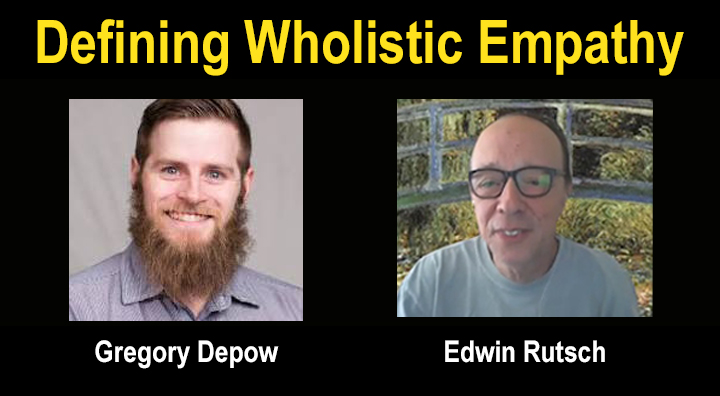|
|
|
Culture of Empathy Builder: Gregory Depow
Zoom Meeting summary for Edwin Rutsch's Personal Meeting Room (07/15/2025) Quick recapEdwin and Gregory, a director and postdoctoral fellow respectively, discussed their work on empathy and explored various definitions and perspectives on the concept, emphasizing its interpersonal and relational aspects. They shared insights on empathy circles as a structured group format for exploring emotions and experiences, while also discussing the relationship between empathy, compassion, and emotional responses. The conversation concluded with a discussion of empathy's potential biases and its role in building community relationships, along with plans for future collaboration through empathy circles and research initiatives. Next steps
SummaryDefining and Understanding EmpathyEdwin, the director of the Empathy Center, and Gregory, a postdoctoral fellow at the University of California, San Diego, discussed their work on empathy. They shared their definitions and perspectives on empathy, emphasizing its interpersonal and relational aspects. Gregory highlighted the importance of understanding how empathy is received and regulated, while Edwin focused on developing a holistic definition of empathy that includes self-empathy and challenges the traditional cognitive-affective model. They agreed on the value of mutual empathy and the need to consider the context and outcomes of empathy in different situations. Empathy Circle and Listening TechniquesEdwin described the empathy circle, a structured group format involving active listening and turn-taking, which creates space for participants to explore their emotions and experiences. He distinguished between basic empathy (sensing into someone's experience) and imaginative empathy (cognitive empathy), while Gregory highlighted the importance of perspective-taking and curiosity in understanding others' emotions. They discussed how these concepts overlap in real-world experiences and how different terms and definitions can be useful at various levels of analysis. Empathy's Role in Emotional ResilienceGregory and Edwin discussed the relationship between empathy, compassion, and emotional responses. Gregory shared his research findings on how sharing positive emotions can be beneficial for both the empathizer and the target, while focusing on compassion for negative emotions can be protective for the empathizer. Edwin emphasized the importance of active listening and presence in empathy, comparing it to "microdosing love." They also discussed the potential for the empathy circle to build internal resilience and foster understanding in conflict situations. Empathy Circles for Conflict ResolutionEdwin shared his experience with Jodi, who was feeling anxious due to a family conflict involving a murder. He mentioned that they discussed the possibility of an empathy circle to help Jodi manage her anxiety. Gregory provided insights on the importance of nonjudgmental listening, validation, and understanding in empathy circles, emphasizing their potential to foster perceived partner responsiveness and reduce animosity across political divides. They discussed the effectiveness of empathetic approaches in promoting mutual understanding and persuasive communication. Understanding Empathy's Two FacetsEdwin and Gregory discussed the nature of empathy, with Edwin emphasizing that empathy is a mutual, holistic relationship among people in a community, rather than an individualistic, one-sided emotion. They explored how empathy can be biased but argued that the problem lies in bias, not empathy itself. Edwin also distinguished between affective empathy, which includes emotion sharing and personal distress, and effective empathy, which involves staying present with others while reflecting their emotions without becoming overwhelmed. Gregory agreed with this distinction and highlighted the importance of regulating emotion sharing based on the valence of the emotion. AI Empathy Research InsightsGregory discussed his research on empathy, focusing on the receiver's perspective and the effectiveness of AI-generated empathic responses compared to human ones. He explained that while people prefer human responses, AI can sometimes provide better support than no response at all. Gregory shared his findings on the importance of compassion and emotion sharing in empathic interactions and outlined his future research directions, including interventions to improve wise empathy among medical practitioners and youth on social media. Edwin mentioned the positive impact of empathy circles and their role in building a broader empathy movement, inviting Gregory to speak at upcoming events. Empathy Circles and Political MediationEdwin and Gregory discussed the concept of empathy, particularly focusing on criticisms and misconceptions surrounding it. Edwin explained his work on defining and implementing empathy through empathy circles, which he sees as a way to break the victim-perpetrator dynamic and promote understanding between conflicting parties. They explored how empathy can sometimes lead to polarization and how it can be used in political mediation. Gregory expressed interest in participating in an empathy circle and agreed to follow up with Edwin to coordinate a time that works for both of them.
Otter.ai 2025-07-15 - Greg DepowTranscripthttps://otter.ai/u/Dy41-iyJzBzQyBoPI_VAnU9YwGk?view=summary Greg Depow and Edwin Rutsch discussed the challenges and
benefits of empathy, particularly the holistic empathy model. Edwin shared
positive feedback on his model and sought further criticisms. Greg
emphasized the importance of a clear, consistent definition of empathy and
highlighted the practical utility of the holistic approach. They also
touched on the complexities of defining and measuring empathy in academic
settings. Edwin proposed organizing empathy circles, which he believes can
significantly impact individuals' lives, and Greg expressed interest in
collaborating, mentioning support from the Sanford Center for Empathy and
Compassion. Action Items
|
|
||||






